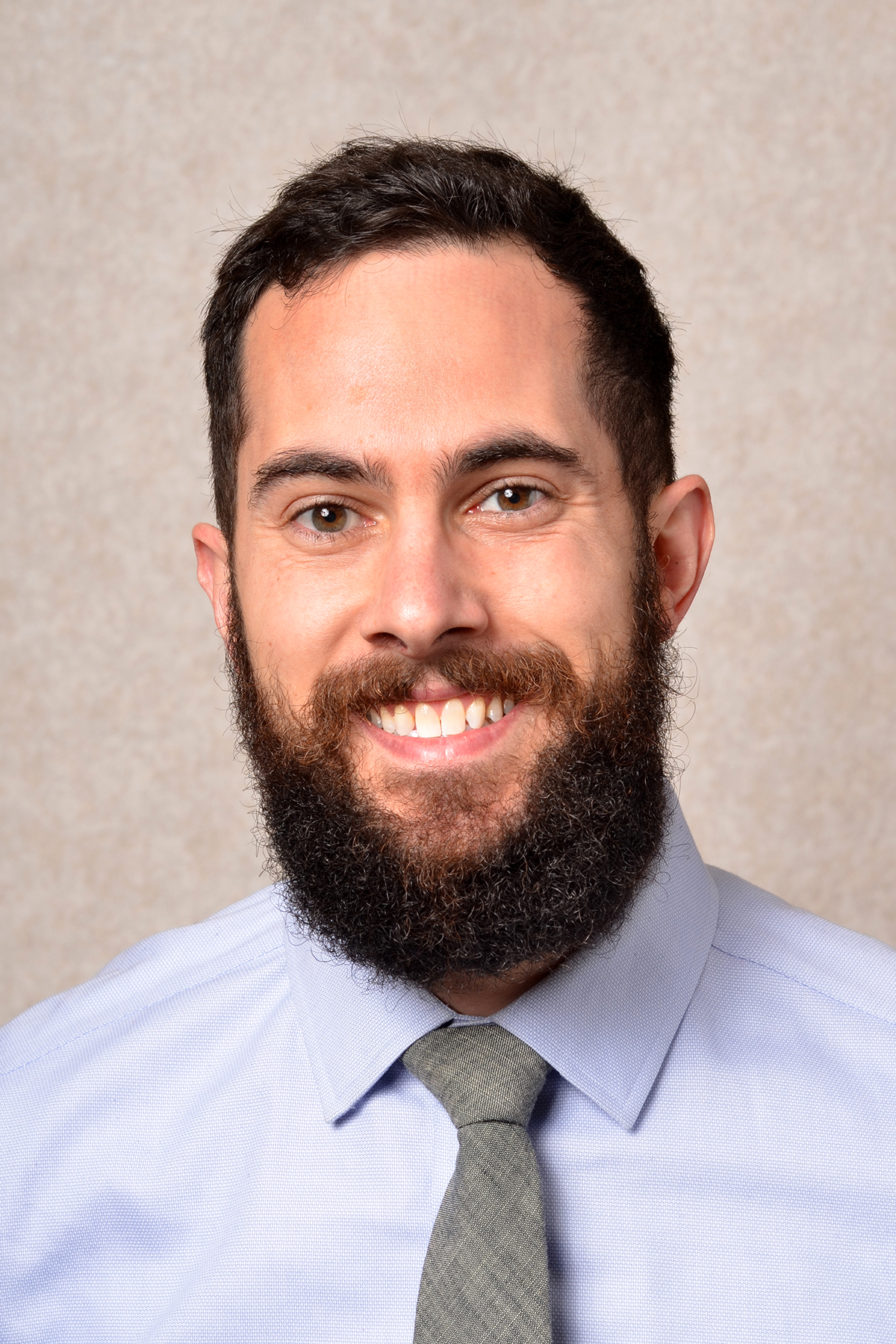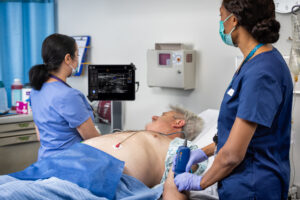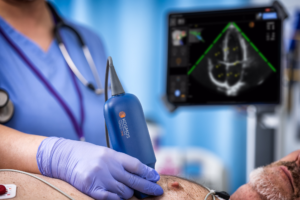The Role of Quality Research and AI in Advancing Point-of-Care Ultrasound (POCUS): Insights from Dr. Michael Prats
The Importance of Quality Research in Point-of-Care Ultrasound (POCUS)
Point-of-care ultrasound has become an indispensable tool in modern medicine, particularly in emergency settings where quick, accurate diagnostics are crucial. However, the effective use of POCUS relies heavily on quality research that validates its efficacy and guides its application in clinical practice [1,2].
Dr. Michael Prats, Associate Professor of Emergency Medicine at The Ohio State University Wexner Medical Center, is a leading voice in the field of ultrasound. He is also the co-founder of the Ultrasound G.E.L Podcast.
In this interview, Dr. Prats underscores the significance of research in advancing POCUS. “Let’s focus on the evidence and recognize ultrasound’s exponential growth over the past decade.”
Dr. Michael Prats says, “We wanted to explore various research articles that focused on point-of-care ultrasound so that we can ensure that we’re all doing the best thing for our patients. We need to critically evaluate the articles to understand the strengths and weaknesses of the evidence.”

AI in Ultrasound: The Need for Rigorous Research
Artificial intelligence (AI) is rapidly becoming a game-changer in various medical fields, including ultrasound. However, like any emerging technology, AI in medicine must be rigorously researched to ensure it enhances, rather than detracts from, patient care [3,4].
“I think having good evidence behind these AI technologies in clinical practice is a really important factor before implementing them into widespread practice. And if the evidence continues to find valuable new uses, then we would expect that it’s taught all over where anybody is being trained” explained Dr. Prats.
Dr. Prats emphasizes that AI is no exception to the need for quality research. “I’m fascinated by these cool developments in machines that can do some of the work we used to do ourselves. I like it, but I do maintain a bit of healthy skepticism and caution in my clinical practice.”
AI in Medicine: Advantages and Disadvantages
In this interview, we reviewed several important considerations.
AI in ultrasound offers potential advantages, including [3,4]:
- Improved Diagnostic Accuracy
- Efficiency
- Education
However, there are also some potential disadvantages:
- Over-Reliance
- Lack of Transparency
- Ethical Concerns
Dr. Prats highlights the importance of continued research in AI, particularly in areas such as:
- Validation of Algorithms: Ensuring that AI algorithms are trained on diverse datasets and are accurate across different populations
- Clinical Integration: Studying how AI can best be integrated into clinical workflows without disrupting patient care
- Education: Researching how AI can be used effectively as a teaching tool without replacing the need for hands-on training
“As a clinician, I understand there’s probably a spectrum of training [in terms of the number of images] you can do when building something like [a deep learning algorithm],” says Dr. Prats.
He elaborates, “I want to see a real-world example because it’s much like any research article. The more trustworthy, the higher the number, the more transparency, the better I can see the chances of that applying to my patients.”
Underscoring his point, bad research can lead to poor conclusions about AI’s utility, either overestimating or underestimating its value. That’s why rigorous, transparent research is crucial as we explore the role of AI ultrasound.
The Role of Education in Effective Ultrasound Practice
While AI offers exciting possibilities, Dr. Prats is quick to point out that it will always remain the same as the need for formal education in ultrasound. AI is a tool that can enhance learning, but it does not replace the need for a solid educational foundation.
In our interview, Dr. Prats emphasized that clinicians must understand when AI is correct and when it is not.
The Evolution of POCUS Education
Ultrasound education has evolved significantly over the past decade. Today, medical students and residents are increasingly exposed to POCUS early in their training, and technological advancements have made ultrasound devices more accessible and user-friendly.
“I would fall more on the side of liking AI to help supplement education, and I don’t think it’s going to replace the need to have an experienced operator or an ultrasound expert helping to train the people. In the right situation, it can be beneficial for the students or the learners trying to learn anatomy using ultrasound in their home before they go to an in-person hands-on session.”
For beginners, Dr Prats said, “Well, for starters, I’m hopeful that it will be even more widespread than it is currently because the goal of education is always to reflect the practice.”
“There are a lot of benefits to the technology available in AI. I’ve also read some fascinating articles about using either virtual reality, augmented, or extended reality. That’s also a fascinating horizon for ultrasound education,” Dr. Prats explains.
Looking ahead, Dr. Prats envisions a future where POCUS education continues to expand, incorporating new technologies like AI and potentially even virtual reality. Ultrasound education will become even more immersive and widespread. Technologies like AI will play a role, but they will supplement and not replace traditional hands-on training.
Dr. Prats says, “We’re also seeing more consistent teaching of ultrasound in undergraduate medical education. I hope this trend continues, with ultrasound being increasingly used and taught wherever medical training occurs, even at earlier stages.” He added, “Regarding how ultrasound will be taught in the future, I don’t want to dismiss hands-on training entirely, as it isn’t easy to replace.”
Addressing Challenges in POCUS Education
One of the main challenges in POCUS education is ensuring that all learners, regardless of their background, have access to quality training.
Dr. Prats emphasizes,“If you gave me one problem to solve, the first thing that comes to mind is getting education to the people who need it the most. Certain populations out there lack the resources for education, the opportunity for learning, or even access to ultrasound. In many situations, portable ultrasound is the most valuable and needed tool. That’s why there’s a lot of effort to use portable ultrasounds in low-income or low-resource settings; they may not have other diagnostic modalities to do the same thing.”
He also highlights the role of AI in education, noting that while it can be a valuable tool, it must be used thoughtfully. AI can provide immediate feedback and guide learners, but it should always be coupled with hands-on practice and mentorship.
Dr. Prats’ Journey and Vision for the Future of Ultrasound
Point-of-care ultrasound has become an indispensable tool in modern medicine, particularly in emergency settings where quick, accurate diagnostics are crucial. However, the effective use of POCUS relies heavily on quality research that validates its efficacy and guides its application in clinical practice [1,2].

Dr. Michael Prats, Associate Professor of Emergency Medicine at The Ohio State University Wexner Medical Center, is a leading voice in the field of ultrasound. He is also the co-founder of the Ultrasound G.E.L Podcast.
In this interview, Dr. Prats underscores the significance of research in advancing POCUS. “Let’s focus on the evidence and recognize ultrasound’s exponential growth over the past decade.”
Dr. Michael Prats says, “We wanted to explore various research articles that focused on point-of-care ultrasound so that we can ensure that we’re all doing the best thing for our patients. We need to critically evaluate the articles to understand the strengths and weaknesses of the evidence.”
Background and Inspiration
Dr. Michael Prats’ journey into emergency medicine and ultrasound began with a passion for both rapid diagnostics and technology. His interest in ultrasound was sparked during his residency, where he saw firsthand the impact that POCUS could have on patient outcomes.
“We saw this potential to affect the practice of ultrasound by focusing on the evidence behind this relatively new modality relative to many other things we do in medicine. So we wanted to examine different research articles that focused on point-of-care ultrasound so that we can ensure that we’re all doing the best thing for our patients,” he recalls.
The Evolution of POCUS and AI
Throughout his career, Dr. Prats has witnessed significant advancements in portable ultrasound technology, particularly with the integration of AI. He is particularly excited about the potential for AI to improve both education and clinical practice.
When asked about his experience with AI-assisted ultrasound devices like Kosmos, Dr. Prats shares his enthusiasm: “Many AI technologies are developed behind a curtain of proprietary development. So, we need to find out how different machines or companies have arrived at this AI calculation in the machine before you with the patient in front of you.”
“We saw this potential to affect the practice of ultrasound by focusing on the evidence behind this relatively new modality relative to many other things we do in medicine. So we wanted to examine different research articles that focused on point-of-care ultrasound so that we can ensure that we’re all doing the best thing for our patients,” he recalls.
Balancing Roles and Future Vision
As a clinician, educator, and podcast host, Dr. Prats balances multiple roles, all of which contribute to his vision for the future of ultrasound.
“I have loved learning from podcasts since medical school, which helped me digest information readily. Then, once I started getting into teaching, that seemed like something that I could do (as well as enjoy) — to create that type of content. It was at a time when there was a big boom in podcasts and a sudden interest in evidence-based medicine.”
The Future of POCUS with AI and Quality Research
The future of POCUS lies at the intersection of quality research, AI advancements, and robust education. As Dr. Prats highlights, each of these elements is crucial for ensuring that ultrasound continues to evolve as a reliable and effective tool in modern medicine.
Ready to revolutionize patient care with cutting-edge ultrasound technology and AI-enhanced diagnostic tools? Explore our range of portable, high-performance ultrasound solutions at EchoNous and elevate your practice today. Learn more about how our products can help empower your clinical decisions and enhance patient outcomes.
Article by Dr. Abhishek Gupta, BDS, MDS
Reviewed by Dr. Danielle Kelvas, MD
References
- Choi, W., Cho, Y. S., Ha, Y. R., Oh, J. H., Lee, H., Kang, B. S., … & Lee, W. W. (2023). Role of point-of-care ultrasound in critical care and emergency medicine: update and future perspective. Clinical and Experimental Emergency Medicine, 10(4), 363.
- Hashim, A., Tahir, M. J., Ullah, I., Asghar, M. S., Siddiqi, H., & Yousaf, Z. (2021). The utility of point of care ultrasonography (POCUS). Annals of Medicine and Surgery, 71, 102982.
- Davenport, T., & Kalakota, R. (2019). The potential for artificial intelligence in healthcare. Future healthcare journal, 6(2), 94-98.
- Basu, K., Sinha, R., Ong, A., & Basu, T. (2020). Artificial intelligence: How is it changing medical sciences and its future? Indian journal of dermatology, 65(5), 365-370.



